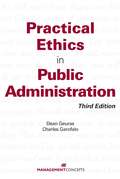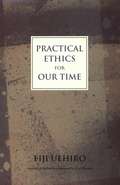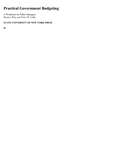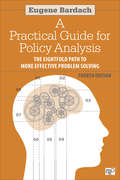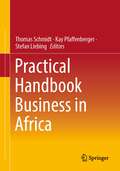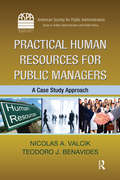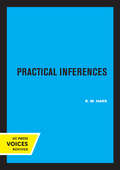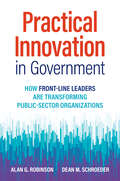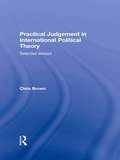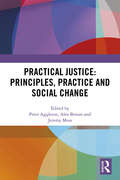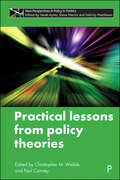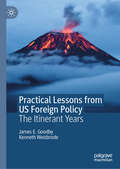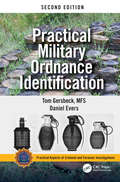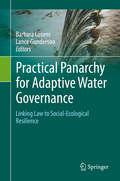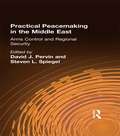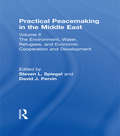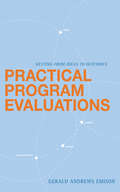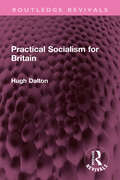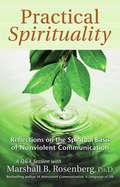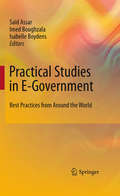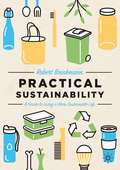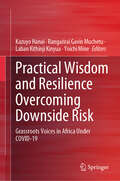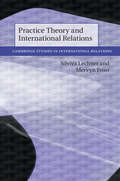- Table View
- List View
Practical Ethics In Public Administration
by Dean Gueras Charles GarofaloMake the Right Choice - Enhance Your Ethical Decision Making Skills Today!Ethical issues arise in all walks of life, but none have implications as far-reaching and serious as those related to public management. Most people working in the public sector want to do the "right" thing, but the issues can be highly complex or just not lend themselves to easy answers. Practical Ethics in Public Administration, Third Edition, provides the tools, techniques, and methods needed to help meet these challenges. This completely updated third edition provides public sector professionals the information they need to face the ethical issues that arise in the course of a day's work, address those issues with greater self-assurance, perform their duties in an ethically justifiable manner, and explain their actions reasonably.This new edition:• Covers emerging ethical issues surrounding public-private partnerships• Examines the shift from compliance-based to integrity-based ethics programs• Explores the context of moral competency
Practical Ethics for Our Time
by Carl Becker Eiji UehiroA scathing critique of the global consumer culture that's bound to cause controversy among Western readers, Practical Ethics for Our Time argues that Japan's future success as a nation depends upon the ability of its citizens to uphold traditional family values and to fashion new, environmentally sustainable patterns in their daily lives.Mr. Uehiro's argument is not unfamiliar. He posits that Japan's rapid industrialization and Westernization since the Meiji Restoration has created a nation of people with an insatiable appet ite for designer clothing, luxury cars, and high-tech gadgets but with a profound sense of spiritual emptiness. Uehiro suggests that as human be ings move farther and farther away from the process of producing goods themselves,they begin to take their abundance for granted, and thus lose a sense of thankfulness for what they have. This leads to a world in which human interactions become superficial and commodified, and ethics take a back seat to other, more quantifiable concerns. While Japan has gained tremendous international respect for its rapid industrialization since World War II , Uehiro believes that Japan has a greater role to play on the international stage as a model of proper ethical behavior- but only if it can reverse Western-influenced trends.
Practical Government Budgeting: A Workbook For Public Managers (Suny Series In Public Administration Ser.)
by Susan L. Riley Peter W. ColbyThis book provides descriptions, instructions, and exercises to help readers master government budgeting as it is actually practiced. University courses and training programs serving present and future state and local officials and staff will learn how to do public budgeting in this relevant, practical, and useful workbook. Each chapter presents techniques followed by step-by-step instructions complete with examples to help students learn the material. Self-test exercises conclude each chapter.
Practical Guide for Policy Analysis: The Eightfold Path to More Effective Problem Solving
by Eugene S. BardachWith his original eightfold approach, Bardach encapsulates more than 35 years of teaching students effective, accurate, and persuasive policy analysis. This bestselling handbook presents dozens of concrete tips, interesting case studies, and step-by-step strategies for the budding analyst as well as the seasoned professional.
Practical Handbook Business in Africa
by Thomas Schmidt Kay Pfaffenberger Stefan LiebingAfrica is a continent on the upswing, developing great economic momentum. If German companies want to participate in Africa's upswing, they need to be familiar with some special features. This book shows the way to successful business in Africa. It is a practical, yet scientifically based guide for all entrepreneurs and economically interested parties who want to be successful in Africa. It combines the experience of many companies with the scientific perspective and findings of the Centre for Business and Technology in Africa at Flensburg University of Applied Sciences.In the 2nd edition new developments on the African continent are taken up and current answers are given to the classical questions, which each actor must answer for itself, which wants to be economically successful in Africa: WHY Africa is interesting for the business, WHERE the largest chances of success exist, HOW to proceed and WHICH approaches for the future organization of the economic relations between Germany and Africa are promising.The book describes how to invest in Africa and bundles the current experiences of managers of large corporations and family businesses with a long history on the continent.
Practical Human Resources for Public Managers: A Case Study Approach (ASPA Series in Public Administration and Public Policy)
by Nicolas A. Valcik Teodoro J. BenavidesEmployers face a myriad of issues when hiring: how to recruit, whom to select, how to interview, Equal Employment Opportunity policies, fair salary offerings, health issues, performance evaluations, behavior/disciplinary actions, turnover, and the list goes on and on. Practical Human Resources Management for Public Managers: A Case Study Approach provides insight into human resource trends and demonstrates how complex situations can be successfully managed by public sector practitioners. The authors take us step by step into the "real world" with examples of historical events that compare "What Happened" with "What Could Have Happened" as well as suggested readings for more in-depth analysis and important points to remember. Exploring the space between theory and what actually occurs in the world, this book supplies instructional case studies based upon actual events. The authors introduce key human resources issues with clear, concise language and provide techniques to address these issues in a real-world setting. The case studies cover legal and liability issues, recruiting and hiring, employee performance, reward and discipline issues, retention, termination, workplace violence, mentorship, motivation, and managing through transitions. The authors bring know-how from a wide array of working environments, including teaching and administrative experience in public universities and management in municipalities of various population sizes from a few thousand to more than a million. They have also worked in a variety of capacities within these organizations, which allow them to see different perspectives on how different departments handle similar situations. They use their from-the-trenches knowledge to explore pragmatic ways to deal with human resource issues in public sector workplaces.
Practical Inferences (New Studies in Practical Philosophy)
by R.M. HareThis title is part of UC Press's Voices Revived program, which commemorates University of California Press’s mission to seek out and cultivate the brightest minds and give them voice, reach, and impact. Drawing on a backlist dating to 1893, Voices Revived makes high-quality, peer-reviewed scholarship accessible once again using print-on-demand technology. This title was originally published in 1971.
Practical Innovation in Government: How Front-Line Leaders Are Transforming Public-Sector Organizations
by Dean M. Schroeder Alan G RobinsonThis book is a comprehensive guide to an exciting new approach that managers at any level can use to transform their corners of government.Whether people want more government or less, everyone wants an efficient government. Traditional thinking is that this requires a government to be run more like a business. But a government is not a business, and this approach merely replaces old problems with new ones.In their six-year, five-country study of seventy-seven government organizations-ranging from small departments to entire states-Alan Robinson and Dean Schroeder found that the predominant private-sector approaches to improvement don't work well in the public sector, while practices that are rare in the private sector prove highly effective. The highest performers they studied had attained levels of efficiency that rivaled the best private-sector companies.Rather than management making the improvements, as is the norm in the private sector, these high-performers focused on front-line-driven improvement, where most of the change activity was led by supervisors and low-level managers who unleashed the creativity and ideas of their employees to improve their operations bit by bit every day.You'll discover how Denver's Department of Excise and Licenses reduced wait times from an hour and forty minutes to just seven minutes; how the Washington State Patrol garage tripled its productivity and became a national benchmark; how a K8 school in New Brunswick, Canada, boosted the percentage of students reading at the appropriate age level from 22 percent to 78 percent; and much more.
Practical Judgement in International Political Theory: Selected Essays
by Chris BrownChris Brown is a prominent international political theorist who has contributed to debates on pluralism, justice and human rights. This book draws together seventeen of his most important and influential articles from the last twenty years. These essays include influential statements on the role of normative theory and international ethics, the so-called ‘cosmopolitan-communitarian debate’ and anti-foundationalist thought in international relations, as well as important contributions to Rawlsian and Post-Rawlsian theories of international and global justice. The most recent papers address subjects such as the notion of global civil society, and controversies over the ethics of pre-emptive warfare, and the inevitably selective nature of humanitarian interventions. The book includes a framing introduction written for this volume, in which Brown discusses his own influences, and the evolution of his thinking throughout his career. Although this evolution has involved a progressively less critical viewpoint towards liberal thought and liberal internationalism, and a greater commitment to universal values, some things have remained constant – in particular a focus on the importance of political judgement and scepticism directed towards the idea that there are simple solutions to complex problems. The collection ends fittingly with a critique of the popular cosmopolitanism of figures such as Bono and Bob Geldof. This collection will be essential reading for all scholars and graduates with an interest in international political theory.
Practical Justice: Principles, Practice And Social Change
by Jeremy Moss Peter Aggleton Alex BroomThis volume engages with questions of justice and equality, and how these can be achieved in modern society. It explores how theory and research can inform policy and practice to bring about real change in people’s lives, helping readers understand and interrogate patterns and causes of inequality, while investigating how these might be remedied. Chapters outline ways in which theories of justice inform and are factored into effective actions, programmes and interventions. The book includes an international selection of case studies. These range from global inequalities in development and health to cross-border conflict; from gender justice to disability violence; from child protection to disability-inclusive research; from illicit drug use to torture prevention; and from prison wellbeing to sexual and reproductive health and rights. Together, contributors explore: how social science and humanities scholarship can lead to a better understanding of, and capacity to respond to, key social issues and problems the importance of normative reflection and a concern for principles of justice in pursuit of social change the importance of community voice and grassroots action in the pursuit of justice, equity and equality. Envisioning a better world – in which concern for the just treatment of all trumps the pursuit of privilege and inequality – Practical Justice: Principles, Practice and Social Change will appeal to students and academics in disciplines as diverse as philosophy, political science, sociology, anthropology, geography and education, and in fields such as policy studies, criminology, healthcare, social work and social welfare.
Practical Lessons from Policy Theories (New Perspectives in Policy and Politics)
by Christopher M. Weible and Paul CairneyFirst published as a special issue of Policy & Politics, this critical and practical volume challenges policy theory scholars to change the way they produce and communicate research. Leading academics propose eight ways to synthesise and translate state of the art knowledge to equip scholars to communicate their insights with each other and a wider audience. Chapters consider topics such as narratives as tools for influencing policy change, essential habits of successful policy entrepreneurs, and applying cultural theory to navigate the policy process. Providing theoretical clarity and accumulated knowledge, this text highlights the vital importance of translating policy research in practical and understandable ways. The articles on which Chapters 2, 3 and 5 are based are available Open Access under CC-BY-NC licence.
Practical Lessons from US Foreign Policy: The Itinerant Years
by Kenneth Weisbrode James E. GoodbyIn foreign policy, the Trump administration has appeared to depart from long-standing norms of international behavior that have underwritten American primacy for decades in a more interdependent and prosperous world. In this book, a diplomat and a historian revisit that perception by examining and reproducing several of their own essays during the past twenty years. The essays reveal that Trump's style exaggerates tendencies towards unilateralism already present in the actions, if not the policies, of previous presidents, and in their neglect of three imperatives: collective security, regional integration, and diplomatic imagination. It is not too late, however, to remedy the problem by learning the lessons of the recent past.
Practical Military Ordnance Identification, Second Edition (Practical Aspects of Criminal and Forensic Investigations)
by Thomas GersbeckThe threat variables associated with military ordnance are enormous, requiring the application of a structured process to identify unknown munitions. The focus of Practical Military Ordnance Identification, Second Edition is the application of a practical deductive process to identify unknown ordnance items that are commonly recovered outside military control. The author supplies a seven-step procedure to identify unknown munitions by their category, group, and type. Detailed logic trees help users narrow down the possibilities in order to accurately identify ordnance. The book covers the safety precautions associated with each category and group of ordnance. It describes many ordnance construction characteristics and explains the fundamentals of military ordnance fuzing. Appendices define terms and supply abbreviations and acronyms used to describe military ordnances. Coverage new to this edition include: a list of conventional markings; additional safety precautions to take; an expanded list of high explosives; additional technical details on explosives effects; hazards associated with pyrotechnics, pyrophorics, smoke compounds, and incendiaries; a section on pre-1870 projectiles, hand grenades, landmines, underwater ordnances, and rockets; and details on Man-Portable-Air-Defense-Systems (MANPADS) missile systems.
Practical Panarchy for Adaptive Water Governance
by Barbara Cosens Lance GundersonThis book presents the results of an interdisciplinary project that examined how law, policy and ecological dynamics influence the governance of regional scale water based social-ecological systems in the United States and Australia. The volume explores the obstacles and opportunities for governance that is capable of management, adaptation, and transformation in these regional social-ecological systems as they respond to accelerating environmental change. With the onset of the Anthropocene, global and regional changes in biophysical inputs to these systems will challenge their capacity to respond while maintaining functions of water supply, flood control, hydropower production, water quality, and biodiversity. Governance lies at the heart of the capacity of these systems to meet these challenges. Assessment of water basins in the United States and Australia indicates that state-centric governance of these complex and dynamic social-environmental systems is evolving to a more complex, diverse, and complex array public and private arrangements. In this process, three challenges emerge for water governance to become adaptive to environmental change. First, is the need for legal reform to remove barriers to adaptive governance by authorizing government agencies to prepare for windows of opportunity through adaptive planning, and to institutionalize the results of innovative solutions that arise once a window opens. Second, is the need for legal reform to give government agencies the authority to facilitate and participate in adaptive management and governance. This must be accompanied by parallel legal reform to assure that engagement of private and economic actors and the increase in governmental flexibility does not destabilize basin economies or come at the expense of legitimacy, accountability, equity, and justice. Third, development of means to continually assess thresholds and resilience of social-ecological systems and the adaptive capacity of their current governance to structure actions at multiple scales. The massive investment in water infrastructure on the river basins studied has improved the agricultural, urban and economic sectors, largely at the cost of other social and environmental values. Today the infrastructure is aging and in need of substantial investment for those benefits to continue and adapt to ongoing environmental changes. The renewal of institutions and heavily engineered water systems also presents the opportunity to modernize these systems to address inequity and align with the values and objectives of the 21st century. Creative approaches are needed to transform and modernize water governance that increases the capacity of these water-based social-ecological systems to innovate, adapt, and learn, will provide the tools needed to navigate an uncertain future.
Practical Peacemaking in the Middle East: Arms Control and Regional Security
by Steven L. Spiegel David J. PervinFirst Published in 1995. Routledge is an imprint of Taylor & Francis, an informa company.
Practical Peacemaking in the Middle East: The Environment, Water, Refugees, and Economic Cooperation and Development
by Steven L. Spiegel David J. PervinFirst published in 1995. Routledge is an imprint of Taylor & Francis, an informa company.
Practical Program Evaluations: Getting from Ideas to Outcomes
by Gerald Andrews EmisonProgram evaluation requires attention to rationality, rigor, and careful methods. Yet precision and accuracy alone do not guarantee that program evaluations will be implemented. What prevents an evaluation from being thrown on a shelf to gather dust? Author Gerald Emison, a practitioner with more than 20 years experience, knows that the consumers of program evaluations operate in a decidedly practical and political arena where decision making is a very human and sometimes messy process. Getting students from ideas to outcomes means that knowing clients’ needs and effectively communicating results are just as crucial as an evaluator’s theoretical knowledge and statistical analysis. Emison wants to help students translate their mastery of methodology into useable program evaluations that are implemented and affect actual programs.Short and to-the-point, Practical Program Evaluations hones in on the applied side of program evaluation, with the goal of creating and presenting program evaluations that are used and improve public enterprises. A handy supplement to core texts, Emison offers honest advice, emphasizing practices that focus on the client, content, control and communication of program evaluations.
Practical Socialism for Britain (Routledge Revivals)
by Hugh DaltonFirst published in 1935, Practical Socialism for Britain presents an assessment of the Labour government’s policy options and aggressively advocates for socialism Britain’s panacea. Citing apathy and panic-mongering as the greatest enemies of the Labour Party, the author asserts that the Labour Party can restore meaning and sincerity to politics by bringing about tangible development and eliminating the militarisation of politics. He also exhorts the Crown and the civil services to be politically neutral and pledge allegiance to the Constitution. Strictly anti-fascist and anti-communist, this book will be of interest to students of history, political science, and government.
Practical Spirituality: Reflections on the Spiritual Basis of Nonviolent Communication
by Marshall B. RosenbergAccording to Marshall B. Rosenberg, Ph.D., our most basic spiritual need is to contribute to the well being of others and ourselves. His brief, unscripted reflections on the spiritual basis of Nonviolent Communication (NVC) will inspire you not only to connect with the Divine in yourself and others, but to begin to create a world of empathy and compassion, where the language we use is the key to enriching life. Discover an intensely satisfying and joyful spiritual experience that begins with you. In these rich pages, learn how NVC can help you achieve a more practical, applied spirituality. Discover how to: - Strengthen the connection between your actions and your spiritual values - Let go of enemy images and moralistic judgments, and experience our common humanity - Connect with others from a place of compassionate energy
Practical Studies in E-Government
by Saïd Assar Imed Boughzala Isabelle BoydensInformation and communication technology (ICT) is permeating all aspects of service management; in the public sector, ICT is improving the capacity of government agencies to provide a wide array of innovative services that benefit citizens. E-Government is emerging as a multidisciplinary field of research based initially on empirical insights from practice. Efforts to theoretically anchor the field have opened perspectives from multiple research domains, as demonstrated in Practical Studies in E-Government. In this volume, the editors and contributors consider the evolution of the e-government field from both practical and research perspectives. Featuring in-depth case studies of initiatives in eight countries, the book deals with such technology-oriented issues as interoperability, prototyping, data quality, and advanced interfaces, and management-oriented issues as e-procurement, e-identification, election results verification, and information privacy. The book features best practices, tools for measuring and improving performance, and analytical methods for researchers.
Practical Sustainability: A Guide to a More Sustainable Life
by Robert BrinkmannThis book will teach you everything you need to know about sustainable living—from reducing your greenhouse gas footprint to making sure that you are part of the green economy. Along the way, readers will learn about the field of sustainability and the “three E’s” of sustainable living—environment, economy, and equity. We are in the midst of great environmental change and all of us need to do everything we can to try to live more gently on the planet. Robert Brinkmann provides a range of options for readers as to what they can do to try to make a difference. Some involve simple lifestyle changes - but he also challenges all of us to commit to make more difficult and more meaningful changes to create a greener, more sustainable world. The book also delves into how we can create more sustainable communities, schools, and organizations. It showcases many examples of people and organizations that are making significant contributions to improving our planet’s sustainability that serve as inspiration and guidance for all of us trying to live more sustainably.
Practical Terrorism Prevention: Reexamining U.S. National Approaches to Addressing the Threat of Ideologically Motivated Violence
by Jackson Costello Lander Rhoades Reimer BeaghleyResearchers examined past U.S. countering violent extremism and terrorism prevention efforts and explored policy options to strengthen terrorism prevention in the future. They found that current terrorism prevention capabilities are relatively limited and that there is a perceived need for federal efforts to help strengthen local capacity. However, any federal efforts will need to focus on building community trust to be successful.
Practical Wisdom and Resilience Overcoming Downside Risk: Grassroots Voices in Africa Under COVID-19
by Yoichi Mine Kazuyo Hanai Rangarirai Gavin Muchetu Laban Kithinji KinyuaThis book classifies and assesses the real and perceived risks associated with both the Covid-19 pandemic and government responses to it in seven African countries — DR Congo, Kenya, Ethiopia, South Africa, Tanzania, Uganda, and Zimbabwe — based on large scale quantitative and qualitative surveys conducted in 2022–2024. It also elucidates the people&’s resilience in overcoming the risks within their political, social, and cultural context. Although research on COVID-19 has been conducted in various fields, particularly in the medical field, the analytical perspective of this book is unique. COVID-19 prevention policies are considered to have seriously increased other risks, such as hunger, other infectious diseases, interruption of education, and various types of human rights violations, including increased conflict, violence against civilians, and political abuse. Therefore, this book argues that COVID-19 prevention policies, as well as the pandemic itself, should be regarded as the downside risk that triggers the deterioration of the other potential risks to vulnerable people. Depicted here is the account of how trust in government, community, and family, within the existing political, social, and cultural environment, created pandemic politics, as elections during the pandemic instrumentalized and politicized government prevention measures. Economic distress threatened people's lives more than COVID-19 during lockdowns and severe behavioral restrictions, and the spread of misinformation discouraged people from being vaccinated. This book will be useful to policy makers and practitioners in international society who are preparing for the next pandemic based on the lessons learned from the COVID-19 pandemic.
Practice Theory and International Relations (Cambridge Studies in International Relations #148)
by Mervyn Frost Silviya LechnerAre social practices actions, or institutional frameworks of interaction structured by common rules? How do social practices such as signing a cheque differ from international practices such as signing a peace treaty? Traversing the fields of international relations (IR) and philosophy, this book defends an institutionalist conception of practices as part of a general practice theory indebted to Oakeshott, Wittgenstein and Hegel. The proposed practice theory has two core aspects: practice internalism and normative descriptivism. In developing a philosophical analysis of social practices that has a special relevance for international relations, Silviya Lechner and Mervyn Frost depart from Pierre Bourdieu's sociology of practice that dominates the current 'practice turn' in IR. The authors show that the contemporary global realm is constituted by two distinct macro practices - the practice of sovereign states and that of global rights.
Practice, Power, and Forms of Life: Sartre’s Appropriation of Hegel and Marx
by Terry PinkardPhilosopher Terry Pinkard revisits Sartre’s later work, illuminating a pivotal stance in Sartre’s understanding of freedom and communal action. Jean-Paul Sartre’s Critique of Dialectical Reason, released to great fanfare in 1960, has since then receded in philosophical visibility. As Sartre’s reputation is now making a comeback, it is time for a reappraisal of his later work. In Practice, Power, and Forms of Life, philosopher Terry Pinkard interprets Sartre’s late work as a fundamental reworking of his earlier ideas, especially in terms of his understanding of the possibility of communal action as genuinely free, which the French philosopher had previously argued was impossible. Pinkard reveals how Sartre was drawn back to Hegel, a move that was itself incited by Sartre’s newfound interest in Marxism. Pinkard argues that Sartre constructed a novel position on freedom that has yet to be adequately taken up and analyzed within philosophy and political theory. Through Sartre, Pinkard advances an argument that contributes to the history of philosophy as well as key debates on action and freedom.
